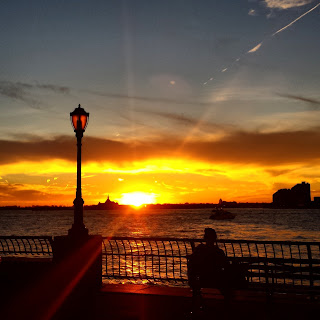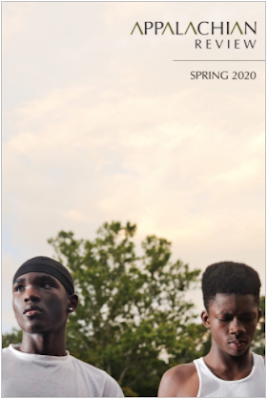In Fear of Ecophobia
Yesterday I got an acceptance notice (yay!) from the online literary magazine Wraparound South, which will be publishing a short essay of mine in audio form. As part of the acceptance, they provided a long list of questions and asked me to answer one of them. (Author responses are included in the "Back Porch" section of their site). The question I picked was "What advice do you have for new and emerging writers?" Here's what I said:
Oliver declares it "obvious" that an understanding of literature requires familiarity with nature. The eco-ignorant are, in Oliver's words, "locked out of the poetry of our world." To illustrate her point, Oliver asks, "What would Romeo's amazed outcry—'It is the East, and Juliet is the sun!'—mean to a reader who is without an intimate feeling for the way, every morning, the light rises and blazes against the darkness?" The horrifying answer, of course, is that it would mean nothing. Without a direct experience of dawn, metaphors of dawn are reduced to an intellectual understanding. No amazement. No heart-in-your-throat wonder. No poetry.
I am deathly afraid of the rise of eco-ignorance. Not merely for its impact on reading and literature, which is depressing enough, but for its repercussions on nature itself. The world outside our windows is being rapidly and systematically destroyed, but as long as our attention remains highjacked by Facebook quizzes and who's trending on Twitter, the destruction won't register. Most of us have no trouble distinguishing a Nike logo from Reebok's, but couldn't tell the difference between a sycamore and a tulip poplar if our life depended on it. Naming leads to noticing. Noticing leads to caring. Caring leads to action. At least that's what I tell myself.
I wish Mary Oliver were wrong. I wish eco-ignorance wasn't a dangerous and tragic reality. I wish children interacted more with the outside world than the pixelated one. But more and more, we're forgetting that interaction is even possible. We "interface" with the world by watching it. We've been reduced to "viewers" and don't realize that we've lost anything.
Here's a true story. I kid you not. A man in New York City is feeling tired and world weary. His high-powered job, previously a source of excitement and pride, isn't satisfying anymore. At a loss for what to do, he consults a therapist. The therapist suggests a change of focus. The man is advised to take time for himself, away from work. "Watch the sun set," the therapist says. The man is skeptical—he says he never watches the sun set—but he agrees to try.
(Are you with me so far? There's nothing to it, right? Just a slightly depressed man who's willing to take time out of his day to view the setting sun. Can you picture it in your mind? When I pictured it, here's what I saw: The man asks his driver to drop him off near a good viewing site—by the Brooklyn Bridge, maybe, or perhaps Battery Park or the High Line. He walks to get a vantage point. Maybe a leans across a rail or sits on a bench, unbuttoning the jacket of his expensive tailored suit. The clouds turn pink or gold. The sun descends and the water shimmers. The sun's orb dips below the horizon, leaving a swiftly sinking yellowish glow. The blue sky above him darkens to indigo. The temperature cools. The man takes a slow deep breath, the lights around him suddenly glaring and bright. He's done his homework. Watched day turn into night.)
But in reality that's not what happened. What happened was, the man went home to his luxury tower on a fashionable street. What happened was, he poured himself a drink and sat on his sofa and glared at the sun through a wall of reinforced glass. And it bored the hell out of him. After a few minutes he quit looking and went online to answer some emails. It had never occurred to him to experience the sunset outdoors. Just as it had never occurred to me that anyone would think to do it indoors. Or that anyone would fail to see the difference.
I would advise all writers to learn something tangible about the world they inhabit, specifically the natural world, which we too easily forget is the source of all our highfalutin technology. A single microchip takes many times its weight in fossil fuels, chemicals, and water to produce. So even if you’re an ecophobe (which I hope for all our sakes you’re not), you’re still deeply connected to and mutually dependent on the non-manufactured world. If you’re not keen on learning which rare earth minerals make up your laptop, at least learn about your fellow organisms. Is that “bird” in your poem a flicker or a nuthatch? Are those “trees” in your story white oaks or black locusts? As writers, we must believe that words matter. Words allow us to see the world around us and, by extension, allow our readers to see what they might not otherwise notice. So don’t settle for generic. Know the world. Know its names.Was I too blunt? Perhaps. But ever since reading Mary Oliver's A Poetry Handbook back in the 1990's, I've been haunted by a fear I'd never before heard expressed: "eco-ignorance," let's call it. Oliver worries that modern-day readers, having lost touch with the natural world, will by extension lose touch with the world's great literatures—literatures that are imbued with intimate and direct experiences of nature's inhabitants and processes.
Oliver declares it "obvious" that an understanding of literature requires familiarity with nature. The eco-ignorant are, in Oliver's words, "locked out of the poetry of our world." To illustrate her point, Oliver asks, "What would Romeo's amazed outcry—'It is the East, and Juliet is the sun!'—mean to a reader who is without an intimate feeling for the way, every morning, the light rises and blazes against the darkness?" The horrifying answer, of course, is that it would mean nothing. Without a direct experience of dawn, metaphors of dawn are reduced to an intellectual understanding. No amazement. No heart-in-your-throat wonder. No poetry.
I am deathly afraid of the rise of eco-ignorance. Not merely for its impact on reading and literature, which is depressing enough, but for its repercussions on nature itself. The world outside our windows is being rapidly and systematically destroyed, but as long as our attention remains highjacked by Facebook quizzes and who's trending on Twitter, the destruction won't register. Most of us have no trouble distinguishing a Nike logo from Reebok's, but couldn't tell the difference between a sycamore and a tulip poplar if our life depended on it. Naming leads to noticing. Noticing leads to caring. Caring leads to action. At least that's what I tell myself.
I wish Mary Oliver were wrong. I wish eco-ignorance wasn't a dangerous and tragic reality. I wish children interacted more with the outside world than the pixelated one. But more and more, we're forgetting that interaction is even possible. We "interface" with the world by watching it. We've been reduced to "viewers" and don't realize that we've lost anything.
Here's a true story. I kid you not. A man in New York City is feeling tired and world weary. His high-powered job, previously a source of excitement and pride, isn't satisfying anymore. At a loss for what to do, he consults a therapist. The therapist suggests a change of focus. The man is advised to take time for himself, away from work. "Watch the sun set," the therapist says. The man is skeptical—he says he never watches the sun set—but he agrees to try.
(Are you with me so far? There's nothing to it, right? Just a slightly depressed man who's willing to take time out of his day to view the setting sun. Can you picture it in your mind? When I pictured it, here's what I saw: The man asks his driver to drop him off near a good viewing site—by the Brooklyn Bridge, maybe, or perhaps Battery Park or the High Line. He walks to get a vantage point. Maybe a leans across a rail or sits on a bench, unbuttoning the jacket of his expensive tailored suit. The clouds turn pink or gold. The sun descends and the water shimmers. The sun's orb dips below the horizon, leaving a swiftly sinking yellowish glow. The blue sky above him darkens to indigo. The temperature cools. The man takes a slow deep breath, the lights around him suddenly glaring and bright. He's done his homework. Watched day turn into night.)
But in reality that's not what happened. What happened was, the man went home to his luxury tower on a fashionable street. What happened was, he poured himself a drink and sat on his sofa and glared at the sun through a wall of reinforced glass. And it bored the hell out of him. After a few minutes he quit looking and went online to answer some emails. It had never occurred to him to experience the sunset outdoors. Just as it had never occurred to me that anyone would think to do it indoors. Or that anyone would fail to see the difference.



Comments
Post a Comment